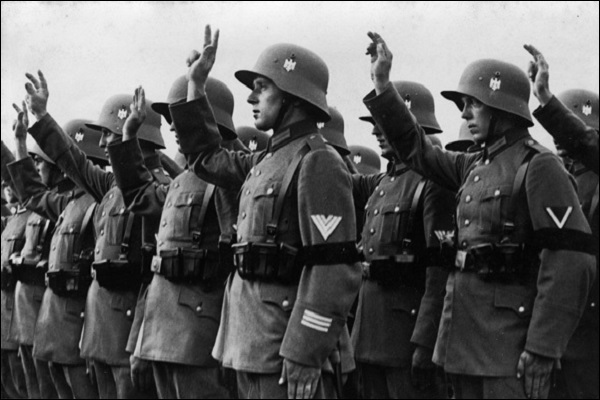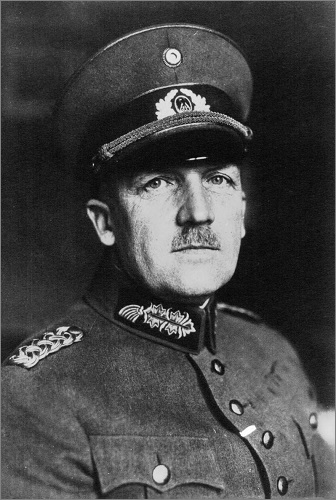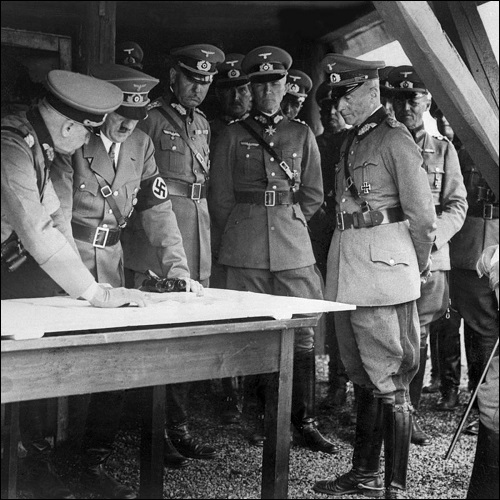It may well be asked why the German
generals, many of them of aristocratic background with
centuries-long family traditions of military service to the
state, bowed to the authority of Adolf Hitler—a coarse,
low-born Austrian who’d served as a common soldier in the
Great War. Certainly there were many among them who looked
down on the Führer and his movement with scorn and distaste.
But however much they disapproved of him personally, the
generals found much to approve in his political program,
particularly where rearmament and foreign policy were
concerned. By and large the Generalität was prepared
to put up with National Socialism as long as it furthered what they viewed as the national interest.
It need hardly be said that for
most senior Army officers, that viewpoint was deeply
conservative. They had served the German Republic
grudgingly, “to prevent the worst from happening,” and they
looked forward to a day when something akin to the defunct
imperial regime might be restored. Thus when old President
von Hindenburg died on 2 August 1934 and the offices of
president and chancellor were fused in Hitler's person as
Führer and Reich Chancellor, very little trouble was made
over the oath that the armed forces were subsequently
required to take:
I swear to God this sacred
oath, that to the Leader of the German Reich and people,
Adolf Hitler, supreme commander of the armed forces, I
shall render unconditional obedience, and that as a
brave soldier I shall at all times be prepared to give
my life for this oath.

2 August 1934: German
soldiers take the oath of loyalty to Hitler (Bundesarchiv)
Contrary to what many people
assumed at the time, this oath was not imposed on the
military by Hitler. The initiative came from the Minister of
Defense, Colonel-General Werner von Blomberg, who hoped by
this means to draw the Führer away from the Nazi Party and
closer to the armed forces—the Army in particular. But it
turned out to have precisely the opposite effect and,
indeed, paved the way for the Army’s ultimate loss of
independence. Toward the end of World War II, when it was
clear to the generals that Hitler was leading Germany to
defeat and destruction, it was the oath to the Führer that
stayed their hand. Many were aware of the conspiracy that
culminated in the 20 July 1944 attempt on Hitler’s life, but with
very few exceptions the senior generals would not commit themselves to an active role against the regime.
Most German officers were no doubt
sincere in their belief that the oath taken in 1934 bound
them in obedience to the Führer. It was not, after all, an
unprecedented requirement. For nearly three centuries Prussian and German
soldiers had taken an oath to the Electoral Prince, then to
the King, and finally to the Kaiser.
The feeling that a sworn bond between the monarch and his
soldiers was right and proper had deep roots in German military
tradition. And without question, from 1934 on Hitler was a monarch in all but name.
The Führer, however, was no Prusso-German ruler in
the mold of Frederick the Great or even Kaiser Wilhelm II.
But the majority of officers were intellectually and
spiritually incapable of seeing past superficial
appearances. By and large, they believed themselves honor
bound to obey the supreme commander’s orders.
Moreover, as Germany rearmed and
the Army expanded, the character of the officer corps
underwent a profound change. Aristocratic Prussians remained
prominent in the senior leadership and on the General Staff,
but lower down men of quite different background began to
receive commissions. Many of these younger men—more and more
with each passing year—were ardent Nazis. And this suited
Hitler’s book, for he hated and distrusted the haughty
generals of noble blood who, he believed, merely tolerated
him and his regime. This general change in outlook was
reinforced by professional considerations. Rearmament
multiplied the career opportunities of all professional
soldiers, and there were few indeed who were willing to
jeopardize their chances of promotion by adopting a critical
attitude toward the Nazi regime.
That the Army’s professed concepts of honor
and duty were fundamentally incompatible with National
Socialism was first revealed to the officer corps in the
“The Night of the Long Knives” (June 1934) Hitler’s
liquidation of the troublesome leadership of the
Sturmabteilung (SA). Ernst Röhm, the SA Chief of Staff,
aspired to transform his brown-shirted stormtroopers into a
new people's army, absorbing the regular German Army in the
process. To this the generals were adamantly opposed and
they pressed Hitler to rein in his turbulent subordinate.
When he did so, employing terror and violence, using the
occasion to eliminate not only Röhm and the rest of the SA leadership but other
regime opponents as well, the Army stood by in readiness to
intervene against the stormtroopers if they tried a coup. And the fact
that two of the Nazis’ victims were brother officers—General
Kurt von Schleicher, who’d served briefly
as chancellor before Hitler’s appointment, and his former
aide, General Ferdinand von Bredow—did not seriously affect
their alliance of convenience with Hitler.

General Kurt von Schleicher (Photo:
Bundesarchiv)
Only a month
elapsed between the murder of Schleicher and Bredow, and the
oath of allegiance to the Führer. The officer corps was
sufficiently disturbed by what had happened to put pressure
on Hitler to rehabilitate the dead men and restore their
honor, and this he did, no doubt calculating that dead men’s
honor posed no threat to National Socialism. And there the
matter rested, the Army turning its attention to the
much more congenial task of rearmament.
Though few
realized it at the time, the Night of the Long Knives and
the oath pledging loyalty to Hitler sowed the
seeds of corruption and subjugation. The lesson was to be driven
home in the Blomberg-Fritsch Affair (early 1938) which
Hitler exploited to purge the Army’s upper ranks of skeptics
and solidify his own control of the armed forces. Once again
the Generalität
grumbled and protested but took no effective action.
Thus when the war began the stage
had already been set for a radical revision of the Army’s
relationship to the regime. In various ways the senior
generals had been compromised—some by ambition, some by a
perversion of patriotism, some by a narrow-minded conception
of duty, some by money. Perhaps most notoriously,
Colonel-General Walther von Brauchitsch, the
Commander-in-Chief of the Army, was indebted to Hitler for
considerable financial assistance in connection with his
divorce and remarriage. And when the early course of the war
made plain Hitler’s malign intentions, the German generals
found themselves poorly placed to protest or oppose the
murderous policies of their supreme commander.



